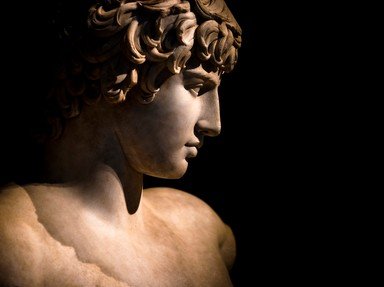Quiz Answer Key and Fun Facts
1. The titan Prometheus risked the anger of the gods to bring humans a very special gift. What did he steal from the gods?
2. Athena, the goddess of war and wisdom, and Poseidon, the god of the sea, had a competition to see who could give Greece's biggest town the best gift. Poseidon created a stream by shoving his trident into a rock. What was Athena's gift?
3. Perseus is one of the most famous heroes of Greek myth. Polydictes, king of Seriphos, had designs on Perseus' mother Danae and tried to get rid of him by sending him to kill Medusa, the Gorgon. Some of the gods decided to help Perseus on his quest by giving him magical items. Which of these was NOT one of them?
4. One love story in Greek myth involves a king who made a statue and fell in love with it, and was overjoyed when the statue was transformed into a human woman. Who was this king? (George Bernard Shaw might know.)
5. In Greek mythology, to which beautiful paradise did heroes and relatives of gods go when they died?
6. Which young man was so handsome that Zeus carried him off to Mount Olympus and made him his personal cupbearer?
7. Arion was a talented musician and poet whose music saved his life when he was thrown overboard by a group of sailors. Which marine creatures rushed to his aid and carried him home?
8. The general Agamemnon's family line was cursed by the gods after his ancestor Tantalus killed his own son, Pelops, and fed his flesh to the gods at a banquet. Which of Tantalus' descendants was finally able to lift the curse on the family?
9. Which Titan goddess was so in love with Endymion, a handsome human, that she asked Zeus to put him in an eternal sleep and give him eternal youth, so she could always gaze upon him?
10. Pandora was a woman whose curiosity got the better of her. She opened a mysterious jar (or box in some versions) and accidentally released all the evils of the world, but one small item remained in the jar. What was the final content of the jar, the antithesis of despair?
Source: Author
Kankurette
This quiz was reviewed by FunTrivia editor
looney_tunes before going online.
Any errors found in FunTrivia content are routinely corrected through our feedback system.
